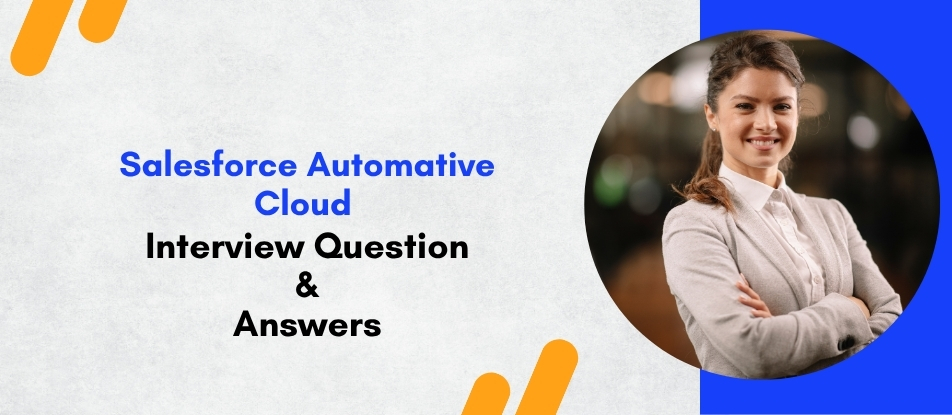
Salesforce Automotive Cloud Training is designed to help automotive professionals master the tools and features needed to deliver seamless customer experiences across sales, service, and marketing. The course explores vehicle management, driver and household relationships, connected car data, recall handling, and OEM-dealer collaboration. Learners will gain expertise in leveraging Salesforce’s Customer 360 platform, predictive insights, and mobility journey tracking to improve customer engagement and operational performance. Ideal for OEMs, dealerships, and service teams embracing digital transformation in the automotive sector.
Salesforce Automotive Cloud Training Interview Questions Answers - For Intermediate
1. How does Salesforce Automotive Cloud handle lead management specific to the automotive industry?
Salesforce Automotive Cloud streamlines lead management by capturing inquiries from various sources such as OEM websites, dealership portals, and digital campaigns. Leads are automatically matched with the right dealership based on location and inventory, and enriched with vehicle preferences and prior interactions. This ensures that sales consultants engage with prospects using contextual insights, accelerating the lead-to-conversion cycle while maintaining brand consistency across multiple touchpoints.
2. How does Automotive Cloud support customer loyalty programs?
Salesforce Automotive Cloud enables the integration of customer loyalty programs by tracking vehicle ownership history, service visits, and engagement metrics. Businesses can use this data to segment customers and offer targeted rewards, such as free services, discounts, or exclusive offers. Loyalty data is visible across the platform, allowing sales and service teams to recognize and reward loyal customers, thereby strengthening long-term relationships.
3. What is the Vehicle Relationship Management model in Automotive Cloud?
Vehicle Relationship Management (VRM) is a central concept in Automotive Cloud that tracks the dynamic relationships between customers and vehicles. It captures multiple ownership changes, leasing history, family or corporate associations, and even shared vehicle scenarios. This granular view allows businesses to personalize engagement strategies and service offerings based on how each vehicle is used and by whom.
4. How is warranty information managed in Salesforce Automotive Cloud?
Warranty information is stored within the Vehicle Record and is automatically updated through integrations with OEM systems or manually by service advisors. The platform provides visibility into active warranties, coverage details, expiration dates, and recall eligibility. This helps dealerships offer timely services while avoiding billing for repairs that fall under warranty, enhancing customer trust and operational efficiency.
5. Explain how the Service Lifecycle is tracked in Automotive Cloud.
The Service Lifecycle includes every phase from appointment booking to post-service follow-up. Automotive Cloud tracks service requests, technician assignments, parts availability, invoice generation, and customer feedback. This end-to-end visibility enables dealerships to reduce turnaround times, monitor service quality, and identify patterns in maintenance needs or vehicle issues.
6. What role does AI play in Automotive Cloud?
AI, through Salesforce Einstein, enhances Automotive Cloud by enabling predictive insights such as service scheduling recommendations, churn probability, and customer sentiment analysis. AI can identify patterns in vehicle issues, recommend upsell opportunities, and automate repetitive tasks, helping users make informed decisions faster while improving the overall customer experience.
7. How does Automotive Cloud help manage vehicle inventory?
Automotive Cloud offers vehicle inventory tracking across multiple dealership locations. It allows sales reps to check stock availability, vehicle configurations, pricing, and status (in transit, in stock, reserved). This transparency helps match customer needs to the right vehicle quickly and reduces lost sales due to inventory mismatches.
8. What is the role of Salesforce Flow in Automotive Cloud?
Salesforce Flow automates business processes such as service appointment booking, follow-up emails, and vehicle delivery notifications. With Flow, dealerships can streamline workflows, reduce manual errors, and ensure consistency in customer interactions. For instance, after a service appointment is completed, a flow can trigger a satisfaction survey or send reminders for the next service.
9. How is test drive scheduling handled in Automotive Cloud?
Test drive scheduling is managed through custom workflows that capture customer preferences, vehicle models of interest, preferred timing, and location. Integrated calendars and automated reminders ensure coordination between customers and dealership staff. The platform can also trigger pre-drive vehicle checks and post-drive follow-ups for feedback or conversion.
10. Describe how Automotive Cloud improves recall management.
Automotive Cloud streamlines recall management by identifying affected vehicles based on VIN and OEM recall data. It enables mass communication to vehicle owners via email, SMS, or in-app notifications and allows dealerships to schedule and track recall service appointments. This ensures compliance, enhances safety, and builds customer confidence in the brand.
11. How can sales forecasting be done using Automotive Cloud?
Sales forecasting in Automotive Cloud leverages CRM Analytics and historical data such as leads, conversions, and seasonal trends. Managers can generate dashboards to visualize sales pipeline health, predict future vehicle demand, and allocate resources accordingly. Forecasts can also be segmented by region, dealership, or vehicle category for granular planning.
12. What kind of mobile functionality is available in Automotive Cloud?
Automotive Cloud supports mobile access through the Salesforce mobile app, enabling sales reps and service technicians to view customer and vehicle records, update statuses, schedule appointments, and receive alerts while on the go. Mobile access improves field productivity and ensures real-time updates from showroom floors or service bays.
13. How does Automotive Cloud support B2B fleet or commercial vehicle management?
For B2B clients, Automotive Cloud can manage fleet accounts with multiple vehicles and drivers. It tracks service contracts, vehicle leasing terms, maintenance schedules, and bulk purchase history. The platform allows for account-based marketing, SLA management, and relationship tracking at both the company and driver levels, enabling personalized enterprise engagement.
14. How is compliance with regional regulations (like GDPR) maintained in Automotive Cloud?
Automotive Cloud adheres to Salesforce’s global security and compliance frameworks. It includes features like data residency controls, consent management, audit logging, and access control. Customers can request data deletion, view usage history, or update their preferences, ensuring regulatory compliance across data collection and communication channels.
15. What are some challenges dealerships may face during Automotive Cloud implementation?
Common challenges include data migration from legacy DMS systems, integration with OEM platforms, and user training. Additionally, change management resistance can affect adoption. To mitigate these issues, a phased implementation approach, strong stakeholder engagement, and leveraging Salesforce implementation partners are recommended for a successful rollout.
Salesforce Automotive Cloud Training Interview Questions Answers - For Advanced
1. How does Salesforce Automotive Cloud support real-time service personalization using telematics data?
Salesforce Automotive Cloud integrates with connected vehicle platforms to retrieve real-time telematics data, such as engine diagnostics, fuel levels, mileage, battery health, and driving behavior. This information is mapped to the Vehicle Record and is used to personalize service offerings. For example, when the system detects a warning light or diagnostic trouble code (DTC), it can automatically create a service case and notify the driver via email, SMS, or mobile app. Service advisors are informed in advance, allowing them to prepare necessary parts and reduce wait times. Moreover, the system can schedule appointments based on predicted failures rather than fixed intervals, thus enabling predictive maintenance. This results in better uptime, improved customer satisfaction, and operational efficiency.
2. Explain the role of Salesforce Industries CPQ in Automotive Cloud for vehicle configuration and pricing.
Salesforce Industries CPQ (Configure, Price, Quote) plays a vital role in enabling dealerships and OEMs to manage complex vehicle configurations and personalized pricing strategies. Automotive Cloud uses CPQ to allow sales teams and even customers to configure vehicles based on options like trims, color, accessories, financing plans, and warranty packages. Each selection dynamically updates the pricing and availability, ensuring accuracy and reducing negotiation friction. The rules-based engine ensures that only compatible configurations are selectable, avoiding manual errors. CPQ also integrates with approval workflows and quote generation systems, enabling dealerships to send branded, accurate, and compliant quotes instantly, reducing the sales cycle dramatically.
3. How does the Automotive Cloud handle multi-channel lead orchestration across digital and physical touchpoints?
Leads in the Automotive Cloud are captured from multiple digital channels (OEM websites, social media, third-party listings, email campaigns) and physical ones (walk-ins, test drives, events). Through lead assignment rules and automation, leads are routed to the appropriate dealership or sales consultant based on geography, vehicle interest, or channel source. Omni-channel orchestration ensures that no lead is missed, and each is nurtured with tailored journeys using Marketing Cloud. For instance, a customer who showed interest in an EV online can be retargeted with service promotions or upgrade offers during their in-store visit. This continuity across touchpoints enhances conversion and ensures a cohesive brand experience.
4. Describe how Salesforce Automotive Cloud supports subscription-based vehicle models.
As the automotive industry shifts toward usage-based and subscription models, Automotive Cloud adapts by supporting subscription contract management, digital onboarding, usage tracking, and flexible billing cycles. Subscriptions are managed as custom objects linked to the Vehicle and Customer records, with fields for duration, renewals, and entitlements (e.g., miles per month, insurance coverage). Integration with payment gateways and invoicing platforms allows automated billing. Moreover, through connected vehicle data, real-time usage can be tracked to alert customers if they exceed their limits or qualify for upgrades. Salesforce Flow and CPQ can dynamically adjust pricing or trigger renewal workflows, offering a scalable solution for mobility-as-a-service providers.
5. How does the platform manage ownership transitions and vehicle history across multiple users?
Automotive Cloud maintains a persistent Vehicle Record that survives ownership changes. Each new owner or driver is logged under a relationship object, preserving full visibility into vehicle history such as service events, recalls, warranty claims, and modifications. When a vehicle is resold or leased to a new driver, the system automatically updates ownership while archiving the past owner’s data for compliance and historical reference. This is particularly useful for used car programs, as dealerships can present a comprehensive vehicle health report to potential buyers. Furthermore, OEMs and regulators can use this immutable record to enforce warranties, perform recalls, or track vehicle lifecycles.
6. How can OEMs leverage Salesforce Automotive Cloud for centralized campaign management across dealers?
OEMs can use Automotive Cloud to launch and monitor centralized marketing and recall campaigns that span across multiple dealerships. Campaigns are created in Salesforce Marketing Cloud and pushed down to dealership portals, where local teams can customize messaging while maintaining brand consistency. OEMs can track metrics like campaign reach, engagement rates, and service appointment conversions in real time. Additionally, Salesforce Distributed Marketing allows OEMs to empower dealer personnel to send co-branded content to customers while remaining compliant with corporate guidelines. This ensures alignment between OEMs and dealers, faster execution of recall/service campaigns, and higher overall marketing ROI.
7. How is partner relationship management (PRM) handled in Automotive Cloud?
Automotive Cloud offers Partner Relationship Management (PRM) capabilities through Experience Cloud, allowing OEMs to manage interactions with dealers, repair networks, and third-party service providers. Custom portals provide partners with access to leads, inventory, service campaigns, and training resources. Role-based access control ensures that partners only see data relevant to their business. PRM also enables dealers to report service activities, claim incentives, and collaborate on joint sales or marketing efforts. The system logs partner performance metrics—such as lead conversion rates or service compliance—allowing OEMs to benchmark and incentivize top-performing partners, ultimately leading to improved channel performance.
8. How does Automotive Cloud support field service technicians and mobile service operations?
Salesforce Field Service integrates tightly with Automotive Cloud to support mobile service delivery, particularly useful for remote maintenance, EV checkups, or fleet servicing. Field service technicians can receive job details, customer preferences, vehicle diagnostics, and real-time directions through a mobile app. The platform manages scheduling, parts inventory, and technician availability using intelligent optimization. For example, it can cluster appointments geographically to minimize travel time. Service reports, digital signatures, and photos can be captured onsite and synced with the Vehicle Record. This enables a seamless field service operation with enhanced efficiency, transparency, and customer satisfaction.
9. How is compliance with data privacy laws (e.g., GDPR, CCPA) managed within the Automotive Cloud?
Salesforce Automotive Cloud includes built-in tools to manage consent, data residency, and privacy preferences in compliance with global data protection laws. Consent Management objects allow recording of opt-ins for email, SMS, or phone calls, and these preferences are enforced across marketing, service, and sales modules. Data can be masked, anonymized, or deleted upon request through the Data Management Console. Salesforce Shield enhances compliance with field audit trails, encryption, and event monitoring. For multinational OEMs or dealerships, these tools help ensure that customer data is handled ethically and legally across jurisdictions, avoiding fines and maintaining trust.
10. Explain the process of integrating Salesforce Automotive Cloud with third-party IoT platforms.
Integration with IoT platforms (like those from connected car vendors or telematics providers) typically involves secure API communication and real-time event ingestion. Vehicle sensor data—such as tire pressure, engine health, or GPS location—is streamed into Salesforce using MuleSoft or native APIs. These events are processed and stored in custom or standard objects within the Automotive Cloud. Workflows and Flows can then be triggered based on thresholds (e.g., low tire pressure alert creates a case or sends a service reminder). These integrations empower OEMs and service providers to act proactively, reduce incidents, and deliver predictive experiences.
11. How does Automotive Cloud enable advanced customer segmentation for better campaign targeting?
Using Marketing Cloud Audience Builder and CRM Analytics, Automotive Cloud supports deep customer segmentation based on demographic, behavioral, transactional, and telematics data. For instance, segments can be built from customers who drive more than 15,000 km/year, own SUVs, and have not serviced in the last six months. These microsegments are used to launch tailored campaigns, such as tire check offers or trade-in promotions. Segmentation models can also be enhanced using Einstein Analytics to identify high-value or at-risk customers, helping dealerships focus resources where they will have the most impact.
12. What role does Customer Data Platform (CDP) play in Automotive Cloud deployments?
Salesforce CDP (now part of Data Cloud) serves as the unifying layer that ingests, harmonizes, and activates customer data across channels. In Automotive Cloud deployments, CDP aggregates data from CRM, DMS, web, mobile, IoT, and external data providers to create a single, persistent customer profile. Identity resolution merges multiple records belonging to the same individual, improving data quality. These unified profiles are then used to power real-time personalization, cross-channel marketing, and intelligent recommendations. CDP ensures that Automotive Cloud is not only a CRM but a true customer engagement engine.
13. How are performance metrics tracked across dealerships in Automotive Cloud?
Performance metrics such as sales volume, lead conversion rate, service appointment adherence, and CSAT scores are tracked via CRM Analytics dashboards. Automotive Cloud allows for dealership benchmarking, heatmaps of regional performance, and drill-downs into individual KPIs. Dashboards can be configured for dealership managers, OEM executives, and territory leaders, providing role-based insights. Alerts can also be triggered for underperformance, SLA violations, or surges in service demand. This transparency enables data-driven performance management and fosters a competitive, accountable dealership network.
14. How does Automotive Cloud handle trade-in vehicle valuation and offers?
Trade-in processes are managed through custom integrations with valuation providers (like Kelley Blue Book or Edmunds) and internal appraisal tools. When a customer initiates a trade-in request, vehicle details are passed through APIs to fetch real-time market values. Salesforce CPQ can use this data to adjust pricing, financing, or lease terms. Workflows can also route trade-in approvals to sales managers, and notifications can be sent to inventory planners to assess resale or auction potential. Capturing trade-in data in CRM helps identify buying trends and inventory opportunities.
15. How does Automotive Cloud fit into the larger Salesforce ecosystem and digital transformation strategy?
Automotive Cloud is deeply embedded in the broader Salesforce ecosystem, leveraging tools such as Marketing Cloud, Service Cloud, Experience Cloud, MuleSoft, Data Cloud (CDP), Tableau, and Slack. It acts as the automotive-specific layer that aligns customer experience, vehicle data, and partner relationships into one cohesive platform. By adopting Automotive Cloud, businesses align with a composable, cloud-native strategy that supports scalability, continuous innovation, and API-first design. It accelerates digital transformation by offering a single source of truth across OEMs, dealerships, and customers—leading to faster decision-making, improved collaboration, and long-term competitive advantage.
Course Schedule
| Feb, 2026 | Weekdays | Mon-Fri | Enquire Now |
| Weekend | Sat-Sun | Enquire Now | |
| Mar, 2026 | Weekdays | Mon-Fri | Enquire Now |
| Weekend | Sat-Sun | Enquire Now |
Related Courses
Related Articles
- Unlock Your Potential with Kronos Certification Training: Elevate Your Workforce Management Skills
- Join PMP classes online for refining your management skills
- CAD/CAM Interview Questions & Answers to Help You in Getting a Job
- How Customization Can Boost Your Company's Productivity and Efficiency in Microsoft Dynamics 365?
- How Liferay DXP 7.4 Developer Training Can Boost Your Career?
Related Interview
Related FAQ's
- Instructor-led Live Online Interactive Training
- Project Based Customized Learning
- Fast Track Training Program
- Self-paced learning
- In one-on-one training, you have the flexibility to choose the days, timings, and duration according to your preferences.
- We create a personalized training calendar based on your chosen schedule.
- Complete Live Online Interactive Training of the Course
- After Training Recorded Videos
- Session-wise Learning Material and notes for lifetime
- Practical & Assignments exercises
- Global Course Completion Certificate
- 24x7 after Training Support




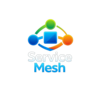
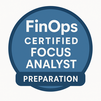

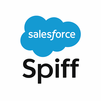
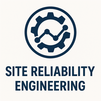
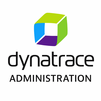



 Join our Live Instructor-Led online classes delivered by industry experts
Join our Live Instructor-Led online classes delivered by industry experts